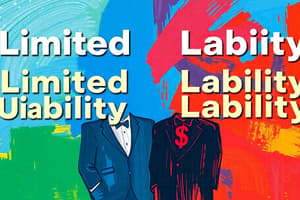Podcast
Questions and Answers
What is one possible advantage of privatisation in accessing finance?
What is one possible advantage of privatisation in accessing finance?
- The government can invest more than private investors.
- Privatised companies can issue shares for funding. (correct)
- Privatised companies cannot secure loans.
- Public sector entities have more financial freedom.
How do public sector industrial relations typically differ from those in the private sector?
How do public sector industrial relations typically differ from those in the private sector?
- Private sector workers engage more in industrial action.
- Private sector workers have better union representation.
- Public sector workers have better working conditions.
- Public sector workers are more likely to engage in industrial action. (correct)
What is a consequence of increased competition resulting from privatisation?
What is a consequence of increased competition resulting from privatisation?
- Lower quality of services.
- Greater choice and lower prices for consumers. (correct)
- Higher prices for consumers.
- Loss of jobs in competitive sectors.
What is one disadvantage of privatisation regarding state assets?
What is one disadvantage of privatisation regarding state assets?
Which outcome may result from the rationalisation of services in privatised companies?
Which outcome may result from the rationalisation of services in privatised companies?
What might be a consequence of fewer social commitments in a privatised setting?
What might be a consequence of fewer social commitments in a privatised setting?
What is a potential issue with the profit motive of privatised companies?
What is a potential issue with the profit motive of privatised companies?
What is likely to occur if a privatised company holds a monopoly in the market?
What is likely to occur if a privatised company holds a monopoly in the market?
How does the government's ability to invest compare to private investors after privatisation?
How does the government's ability to invest compare to private investors after privatisation?
What might happen to employment levels as a result of service efficiency in privatised companies?
What might happen to employment levels as a result of service efficiency in privatised companies?
Flashcards are hidden until you start studying
Study Notes
Sole Trader
- Sole traders assume all financial and personal risks associated with their business.
- They face unlimited liability; their personal assets can be at risk if the business fails.
- Access to capital is typically limited, hindering potential for rapid expansion.
- They bear the full load of business responsibilities, which could lead to burnout.
- Personal income tax rates for sole traders are higher (20%/40%) compared to private limited companies (12.5% corporation tax).
Partnership
- Partnerships consist of 2 to 20 owners, commonly in professional fields like law, accounting, and architecture.
- Formation requires submission of Form LP1 to the Companies Registration Office and a signed deed of partnership outlining roles and profit distribution.
- Partners have unlimited liability; personal assets can be utilized to cover debts.
- Financing options include equity from partners’ personal savings and loans based on business plans.
- Partnerships do not have separate legal status; financial results remain private to partners.
- Decision-making can be slow due to potential disagreements among partners.
- Upon the death of any partner, the partnership dissolves unless a new one is formed.
- Profits are shared according to the deed, leading to potential inequities in compensation.
- Taxation is similar to sole traders with a personal income tax of 20%/40%.
Private Limited Company
- A private limited company can be either limited by shares (Ltd or CLS) or a designated activity company (DAC), accounting for 88% of companies in Ireland.
- Requires only one director; activities are not limited.
- Allows up to 149 shareholders, with profits distributed as dividends or reinvested in the company.
- Limited liability protects shareholders; personal assets are safe, and they can lose only their initial investment.
- Financial records must be reported to the Registrar of Companies for transparency.
- Controlled by shareholders with voting rights based on share ownership.
- Enjoys continuity of existence, remaining operational despite changes in ownership.
- Compared to sole traders and partnerships, private limited companies benefit from a lower corporate tax rate (12.5%).
Advantages of Private Limited Companies
- Unlimited capital access through shares, attracting more investment.
- Stock market presence enhances corporate image, aiding in further investment.
- Benefits from positive publicity, attracting skilled management.
- Often possesses good credit ratings, facilitating loan acquisition.
- Can offer profit-sharing schemes to motivate employees.
Cooperatives
- Operate under a democratic model with one vote per member, regardless of share number.
- Managed by an elected committee that makes critical business decisions.
- Classified as separate legal entities, ensuring continuity beyond member changes.
- Members share profits based on individual contributions or savings.
Disadvantages of Privatisation
- Loss of control over strategic state assets when sold to private entities.
- Potential for increased unemployment as businesses streamline operations for efficiency.
- Essential services may be discontinued if not profitable, affecting remote or underserved areas.
- The profit motive may lead to higher consumer prices and quality deterioration, especially in monopolistic scenarios.
Studying That Suits You
Use AI to generate personalized quizzes and flashcards to suit your learning preferences.




